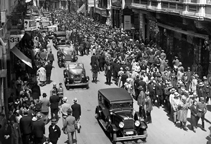The method to be used to reach the objectives and the research purpose will be comparative, documentary and interdisciplinary. The project first proposes a comparative approach of the theme, delimited by three different historical perspectives, as follows: a narrative perspective describing the foreign diplomats’ interaction with the existing social milieu, their public conduct, while defining their social experiences; a cultural perspective capitalizing on their intellectual profile, education level, professional background, and integrity; and a historical perspective that uses multiple independent biographical shots to reconstruct the genealogy of characters, the track records of their diplomatic missions and the posterity of the social events they choose to attend.
The documentary analysis uses constructively the yet-unpublished information resulting from reviewing a vast array of historical sources (diplomatic correspondence, autobiographical literature, media etc.) It also helps verify the reasoning and clarify the controversies arising from the exposure to various social milieus of wannabe-aristocratic characters, as figures such as diplomats claimed to be at the time. The interdisciplinary side of our research involves the historian’s access to work instruments and concepts from the thematic scope of sociology (study of social behaviour) or from the field of ethnopsychology (individual traits of character, dominant psychological trait in nations etc.).
Given the objectives and the methodological orientation pretend above, we suggest the following work plan. The first year (2012-2013): information and documentary research activities carried out in libraries. Update of bibliography according to the current historiographical debate and the latest releases. Identification, classification and reading the latest sources: correspondence volumes, diaries, memories, autobiographies. Assessment, use and provisional advancement of deliverables through the publication of studies and articles in prestigious journals. Second year (2013-2014): researching family estates in libraries and investigating the personnel files of diplomats as found in archival records. Assessment, use and provisional advancement of the new deliverables through the organisation of an interactive workshop to be followed by the full publication of presentations. Third year (2014-2015): researching the references concerning diplomats as found in celebrity newspapers and magazines; reading contemporary accounts (brochures, notes, memos) describing the habits and pastimes of aristocracy in the country’s capital and big cities.
Dissemination of end deliverables through the organisation of an international symposium followed by preparations required for the publication of a collection of studies. The success chances of the project are maximal from a scientific point of view. The proposed methodology challenges the existing sources in an innovative manner and makes the most of information left out of the scope of interest of today’s historiography. The identification, classification and interpretation of unpublished sources from both Romanian and foreign libraries and archives would help broaden the Romanian historians’ view of diplomacy and diplomats, and integrate their social behaviour in the circuit of the most recent research. The experience gained during the doctoral and post-doctoral programme has proved the applicant’s capacity to propose, in the context of Romanian research, relevant topics or subjects in foreign historiography, validated by the local scientific community by acknowledging the results of such works in institutionally evaluated and recognized journals.

